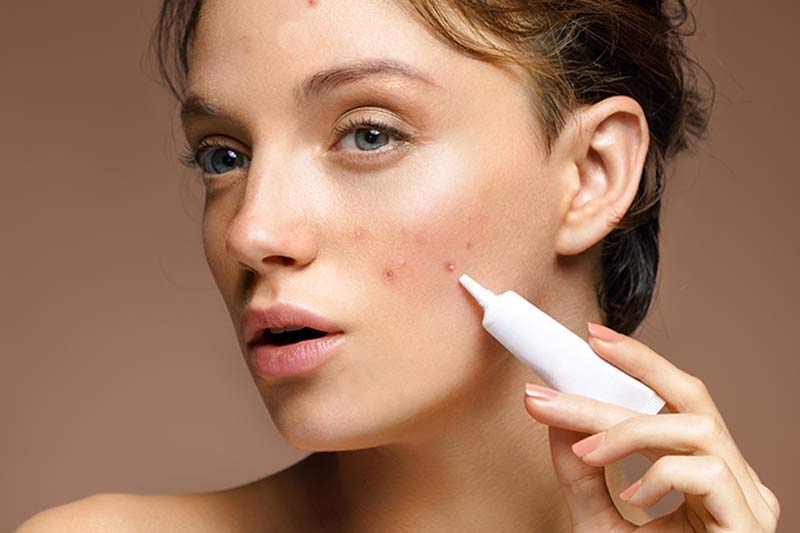Our body produces hyaluronic acid (HA) to lubricate our joints, eyes, and skin. It gives the skin a well-hydrated, glowing appearance, making it look young and healthy. Because of its superb water-attracting quality, hyaluronic acid has become one of the most sought-after ingredients in cosmetic products.
However, skin hydration is only one of the things HA does well. Research and user experience show it can also support acne treatments.
This article explains how hyaluronic acid can help acne and suggests a step-by-step plan for a complete anti-acne skincare routine.

Does Hyaluronic Acid Help Treat Acne?
Hyaluronic acid (HA) can indirectly help with acne treatment thanks to its hydrating properties. When the skin lacks moisture, the body often produces sebum to compensate for the deficiency. Excess sebum can lead to clogged pores and acne. That is why proper skin hydration may help reduce breakouts, and hyaluronic acid is among the most powerful hydrating ingredients.
Hyaluronic acid is not the first line of acne treatment. Acne patients often use retinoids, benzoyl peroxide, and salicylic acid, which may strip the skin of essential oils, causing dryness and peeling. Hyaluronic acid supports this treatment plan, restoring moisture, easing inflammation, and soothing red, irritated skin.
Note: Read our article on how to treat dry skin for valuable tips and product recommendations.
Does HA Help Treat Acne Scars?
Topical hyaluronic acid doesn’t reduce acne scars. Recent studies show it may support laser therapy, improving the appearance of scar tissue, but it isn’t effective on its own.
However, hyaluronic acid dermal fillers are frequently used for mild atrophic scars. They fill the depressed scar tissue with HA, instantly evening and smoothing the skin. Patients need to repeat the treatment every six to 18 months to maintain results.
Note: Read our article on the best acne scar treatments to learn about longer-lasting solutions and effective treatments for more severe acne scars.
Who Should Use Hyaluronic Acid for Acne?
Hyaluronic acid is a gentle, well-tolerated hydrating ingredient that can benefit all skin types with acne, including oily, often dehydrated skin. HA helps balance sebum production and clear pores, contributing to a more even tone.
People on acne medication should use HA as a complementary treatment to reduce the drying effects of the drugs.
As with all skincare products, patients respond differently. In rare cases, they report seeing more breakouts after introducing hyaluronic acid into their skincare routine. It is more likely that other ingredients in the product are causing a reaction, but it is necessary to stop using that product. Consult a dermatologist to help you choose a suitable skincare plan.
When to Avoid Using Hyaluronic Acid for Acne?
In most cases, hyaluronic acid has a positive effect on the skin. However, products with hyaluronic acid often include comedogenic ingredients, which clog pores. They include oils (e.g., avocado, almond, flaxseed), butters (e.g., cocoa, coconut), beeswax, stearic acid, retinol, vitamin E, and many more.
If you have oily, acne-prone skin, carefully read the ingredients list on the label and always choose non-comedogenic products.
How to Use Hyaluronic Acid for Acne
Hyaluronic acid can be used daily for acne. It is added to all types of skincare products, including cleansers, toners, facial masks, serums, and moisturizers.
Hyaluronic acid serums are a good choice for acneic skin because serums typically include few ingredients, minimizing the chance of irritations. They are applied after cleansing and toning the skin and before moisturizers.
Hyaluronic acid moisturizers are also popular, but they often include occlusive ingredients, which form a physical barrier on the skin’s surface to prevent moisture from escaping. These ingredients are heavy and oily and tend to clog pores. Look for lightweight moisturizers with non-comedogenic hydrating ingredients and use them once or twice daily.
Note that hyaluronic acid is a complementary product in acne treatment. Consult an experienced skincare specialist for a complete anti-acne skincare strategy.
Note: Learn how to naturally reduce breakouts with these 11 holistic acne treatments.
Skincare Routine with Hyaluronic Acid for Acne-Prone Skin
The following is an example of a daily skincare routine for people with acne.
In the morning, cleanse your skin with a gentle, non-comedogenic cleanser and pat dry it with a towel. Apply your doctor-recommended acne-control treatment and let the skin absorb it. Next, apply a thin layer of hyaluronic acid serum. If necessary, follow with a moisturizing cream. Broad-spectrum sunscreen is the necessary final step in any daytime skincare routine.
In the evening, cleanse the skin thoroughly to remove cosmetic products, makeup, sweat, and dirt. You can repeat the same layering of products as in the morning routine: acne treatment, hyaluronic acid serum, moisturizer. If you use different products at night, make sure to use a lightweight serum before a heavier cream.
Add hyaluronic acid facial masks to your weekly routine to enhance hydration. Use them up to three times a week.
Hyaluronic acid works well with niacinamide to regulate oil production, reduce acne, and support skin barrier function. You can use the combination daily, in the morning and evening.
Note: Learn how to best use hyaluronic acid and niacinamide together.
Conclusion
Hyaluronic acid is a beneficial and well-tolerated ingredient for people with acne. It increases hydration to help regulate sebum production and fights inflammation caused by acne.
We recommend consulting an experienced skin professional to devise the best anti-acne strategy and explain how to use hyaluronic acid to support your treatment.


